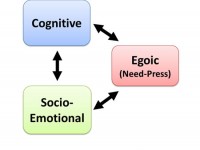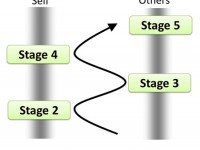Buchbesprechung Otto Laske, Dialectical Thinking For Integral Leaders: A Primer Integral Publishers, ISBN 978-0-9904419-9-1, 2015 (June) Zusammenfassung In dieser Buchbesprechung hebt Michael Habecker die wesentlichen Gedanken eines jeden Kapitels des obigen Buches heraus und schafft dadurch eine klare Zusammenfassung der Intentionen von Otto Laske. Michael Habecker Das neue Buch von Otto Laske, als eine Zusammenfassung seiner Arbeit zum dialektischen Denken, leistet Wesentliches zur Theorie und Praxis menschlichen Denkens als eines unserer wichtigsten Instrumente und Möglichkeiten zum Erkennen und Verstehen von uns selbst, anderen Menschen und der Welt als Ganzes. Es richtet sich im Titel an „integrale“ Führungspersonen und versteht sich in diesem Sinne als ein Angebot an diesem Personenkreis und an die integrale Theorie und Praxis als Ganzes. Dieser Primer fasst die Inhalte des Buches Measuring Hidden Dimensions: The Art and Science of Fully Engaging Adults Band 2 von Otto Laske zusammen, von dem es noch keine deutschsprachige Übersetzung gibt. Übersetzt ist jedoch der Band 1, Potenziale in Menschen erkennen, wecken und messen: Handbuch der entwicklungsorientierten Beratung, in dem es um die sozial emotionale Entwicklung des Menschen geht, welche der Autor klar von der Entwicklung dialektischen Denkens, als dem Gipfel erwachsenen kognitiven Denkens unterscheidet, um die es in dem Primer... Read More...
Category: Team Development
CDF Works on Many Levels
In this short post, I want to draw attention to the fact that what we call CDF -- short for Constructive Developmental Framework (see Wiki) -- is a multilevel methodology, not only a methodology comprising three interrelated modules. What I mean by that is that a CDF user can use this methodology on at least four levels if not more: 1. The real-time interviewing and assessment level 2. The scoring, interpretation, and feedback level 3. The role design level 4. The human-capital level where CDF is a decision theory, both practical and teachable, regarding what is the requisite match between contributors' developmental profile (size of person) and their accountability level (size of role). Up to now, CDF has mainly been taught at the first two levels, under the label of "case studies". These are focused on individual contributors and team members. Jan De Visch has developed theories about the role design level, spelled out in his two books, especially in "Minds Creating Value" (2014, see www.connecttransform.be). I find level 1 highly important because at this level CDF functions in real-time, and what it un-earthes through interviews are DTF generative mechanisms creating movements-in- thought. This is the level of dialog, and... Read More...
How to develop collaborative intelligence?
One of the new IDM initiatives is a 'Rewiring Team Dynamics' workshop which will be organized as a three day seminar in April 2015, near Brussels/Belgium. The key question is: How can we create groups that can learn from mistakes faster, more efficiently, and more consistently than competitors do?' The background of this question is the simple observation that a lot of groups systematically under-perform. They do not make good decisions and they do not solve complex problems in a collaborative way. Traditional Team Building Traditional team building interventions, which are mainly behaviorally focused, do not seem to work when team members are highly developed (especially when they are knowledge workers). The top interventions advised from a behavioral point of view are: foster constructive debate in meetings push back when consensus forms to quickly use devil's advocate thinking look for competing explanations to challenge your observations get some distance, step away, and then try again in order to recognize and interpret complex data use visual graphs or flowcharts to juxtapose the larger picture with the individual puzzle pieces reframe situations and always examine several more options use impromptu meetings when time is limited to generate more options, including unconventional choices... Read More...
Introduction to Developmental Work with Teams
This course introduces team leaders and team coaches to fundamentally new ways of understanding the nature and behavior of teams, with the goal of re-shaping team dynamics. In the course, two main processes are distinguished: interpersonal and task process. Their balance is thought to define team maturity. The purpose of the course is twofold: to change coaches’ perception of teams based on social-emotional insight, and to give them new, dialectical, dialog tools for supporting team members’ interpersonal process and for strengthening their task process. Team maturity and different modes of team leadership are central course topics. The methodology taught goes far beyond purely the behavioral approaches now used, focusing on team members’ developmentally shaped frame of reference on account of which they collaborate in the team and view the organization they art part of the way they do. Students will be asked to submit a concise description of a team they are working with; their descriptions will provide the focus around which CDF tools are introduced and practiced in class. The study cohort itself will serve as a team to practice on. Read more Read More...
Team Coaching from an Adult-Developmental Perspective
In this course, team leaders and team coaches acquire new competences pertaining to working with teams. Specifically, they learn to experience work with team members from a social-emotional perspective and therefore are able to discern different levels of team maturity. Immersing themselves in different ways of meaning making, they also come to understand that the cognitive level of discourse of a team, that is, complexity and fluidity of the discourse, is a function of team members’ maturity both in *thinking* and *meaning-making*. By sharpening their expertise for intuitive as well as reflective work with teams, participants prepare themselves for functioning at a higher level of leadership than they have so far been able to operate on. The practical highlight of the course is that participants are introduced to dialectical thinking, a form of holistic, systemic, and transformational reading of, and responding to, the real world. Although the practice of dialectical thinking in this course is not as extensive as in the subsequent case study, participants gain a fair foothold in reflecting on how, rather than what, team members think, and this gives them new tools for intervening with teams they lead or manage. It also opens a door for them... Read More...

